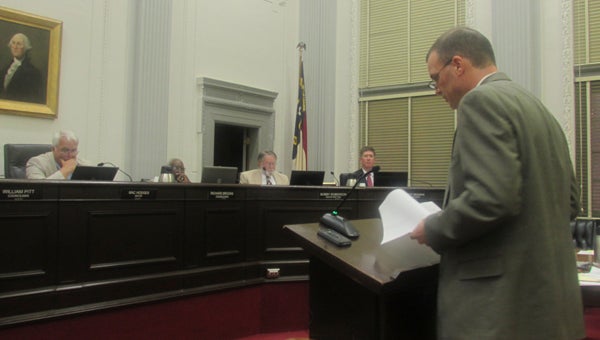Continue reducing transfer
Published 3:59 pm Thursday, December 17, 2015

FILE PHOTO | DAILY NEWS
BUDGET WORK: One of the most important duties of the Washington City Council is to develop and adopt a budget for each fiscal year. Former City Manager Brian Alligood (foreground) reviews the proposed 2015-2016 budget with the mayor and council members earlier this year. After changes, the budget was adopted later.
As Washington officials prepare to begin work early next year on the upcoming 2016-2017 fiscal year budget, they should keep at least on thing in mind: crafting a budget that provides city residents the services they’ve come to expect at a reasonable cost to the city’s taxpayers.
That’s not exactly an easy task, but it’s a task those city officials either were elected to do or hired to do. That task begins Jan. 4, 2016, when budget packets are distributed to the city’s management team and packets are sent to outside agencies likely to seeking money from the city. A budget-planning session is set for Jan. 25, 2016, for the City Council and other city officials who have roles in developing the city’s annual budgets.
As it has done in recent years, the council should continue its effort to reduce the transfer of money from the electric fund to the general fund, with hopes of eliminating that transfer within several years. Several years ago, that transfer was about $1.2 million, but decreased over several years to $470,000. The transfers have been made to help balance past city budgets.
Many Washington Electric Utilities customers who don’t live in the city object to transferring money from the electric fund to the general fund. They contend that at least part of the money they pay on their electric bills is used to subsidize city operations, services and programs.
Some city officials, including former City Manager James C. Smith, have said the transfer from the electric fund to the general fund is similar to a private power company like Duke Energy paying a dividend to its stockholders. Eliminating the annual transfer — or reducing it — and making the general fund self-supporting likely would require finding revenue sources to replace the transfer amount, cutting expenses or a combination of the two, city officials have said. That’s what city officials have been working on in recent years.
Reducing that annual transfer even more in the upcoming budget should be one of the council’s goals as it develops the next budget, which begins July 1, 2016.




